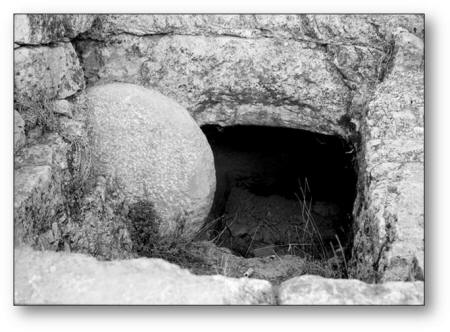|

HOLY SATURDAY
A Reflection on Judgment

“He is not here, for
He is risen, as He said”
(Saint Matthew 28.6)
After
the Last Judgment, when the bodies
of all who ever lived arise and are reunited with their souls to stand
before God in judgment to receive the just recompense for the way they
had chosen to live, perhaps many of those who hear the pronouncement
“Saved!”
— and enter Heaven — will ask of others there also,
“Where is he?,”
“Where is she?”
and they will be told these same words, but in a frightfully different
context: “Non est hic” — “he is not here ... nor is she.” There
is only one other place that they may possibly be — and it is a Hell
of a place to be! Our Blessed Lord admonishes us not to
judge and we must never take it upon
ourselves to assume who is in Heaven and who is in Hell. Only
God knows the heart of man. Most of us will be very surprised where
we will find them ...
and perhaps ourselves.
“Who am I to judge?”
This — by the way — is quite
different from Francis’s notorious “Who
am I to judge?”
or more precisely “If a person is gay and seeks the Lord and has
good will, who am I to judge that person?”
To judge what? Whether he goes
to Heaven or Hell? No! Of course not!
That was not at all the context
of the question which concerned the suitability and wisdom of allowing
homosexuals into the priesthood — especially in light of the
widespread homosexual abuses in the priesthood and seminaries for the
past 20 years!
You, Francis, are able
to — and expected to — judge the suitability of candidates for
the priesthood — not whether or not they will go to Hell.
It is a warranted and necessary
judgment to protect the innocence of children and youth,
and the trust of their parents — to say nothing of
the now scandalized vocation of a Catholic priest
in the community at large
— a scandal which you refuse to seriously address — and correct
— in any meaningful way discernible to Catholics.
Avoiding the Near
Occasion of Sin
If criminals “have good will”
(which some may have) “and seek the Lord” (which some may
do) what would your answer be to the question of allowing them
into seminaries and upon graduation, foisting them onto parishes? It
should be that by definition “criminals” are, for the most
part, wicked men — and to allow them the opportunity to manage the
finances and to “groom” the trust of a parish is — to say the least
— unwise — if not complicitous through criminal negligence
of duty. It is a temptation! A temptation into which
you should not lead them ... nor allow them the opportunity to
submit to that temptation and violate trust. At one time (before
Vatican II) Catholicism called it “avoiding the near occasion of
sin!”
The same goes for homosexuals —
how dare you discriminate ... in their favor!
Editor
Boston Catholic Journal
Comments?
Write us:
editor@boston-catholic-journal.com

Totally
Faithful to the Sacred Deposit of Faith entrusted
to the Holy See in Rome
“Scio
opera tua ... quia modicum habes virtutem, et servasti verbum
Meum, nec non negasti Nomen Meum”
“I
know your works ... that you have but little power, and
yet you have kept My word, and have not denied My Name.”
(Apocalypse 3.8)
Copyright © 2004 - 2026 Boston
Catholic Journal. All rights reserved. Unless otherwise
stated, permission is granted by the Boston Catholic Journal
for the copying and distribution of the articles and audio
files under the following conditions: No additions,
deletions, or changes are to be made to the text or audio
files in any way, and the copies may not be sold for a profit.
In the reproduction, in any format of any image, graphic,
text, or audio file, attribution must be given to the Boston
Catholic Journal.
|
|